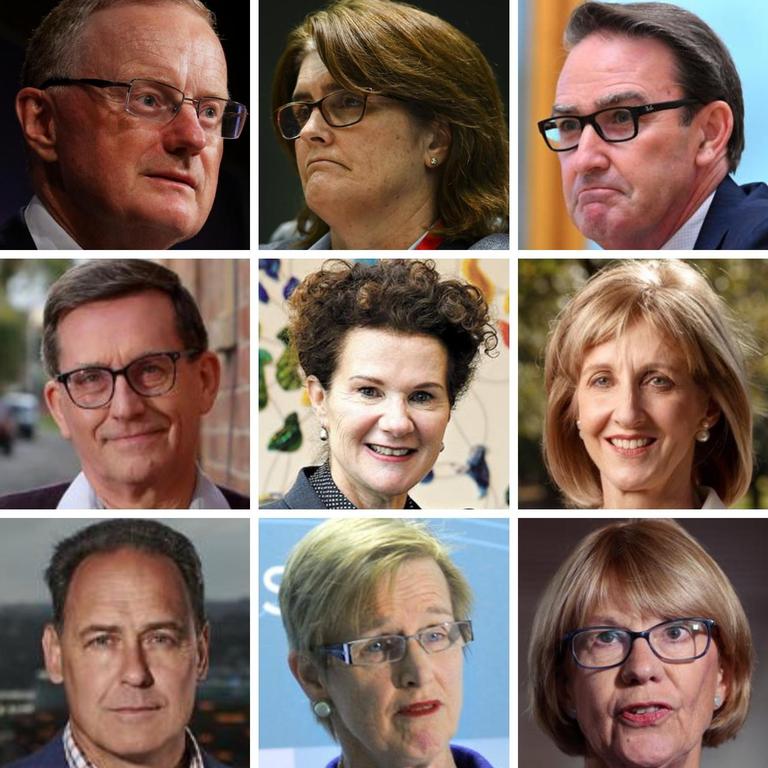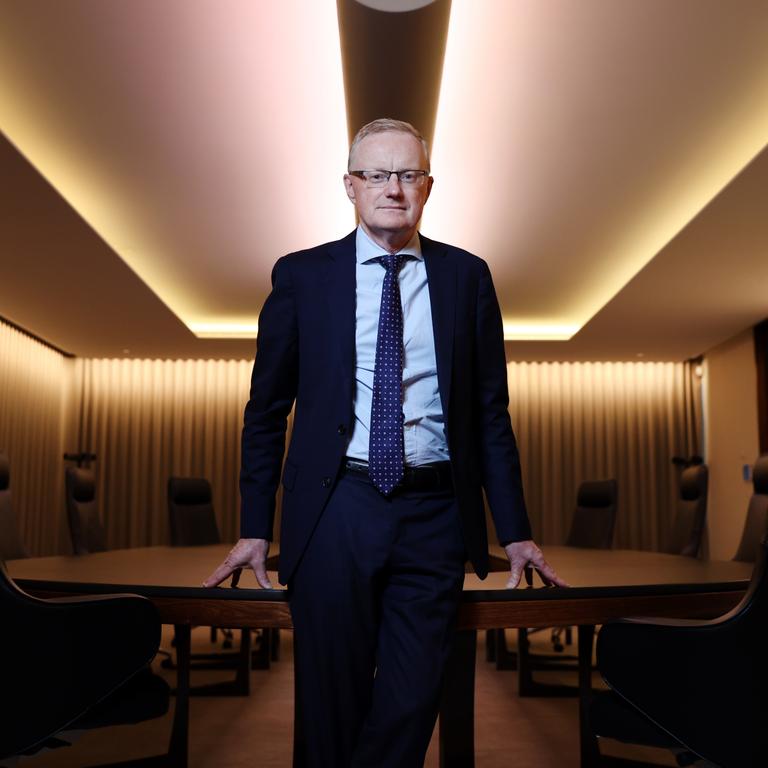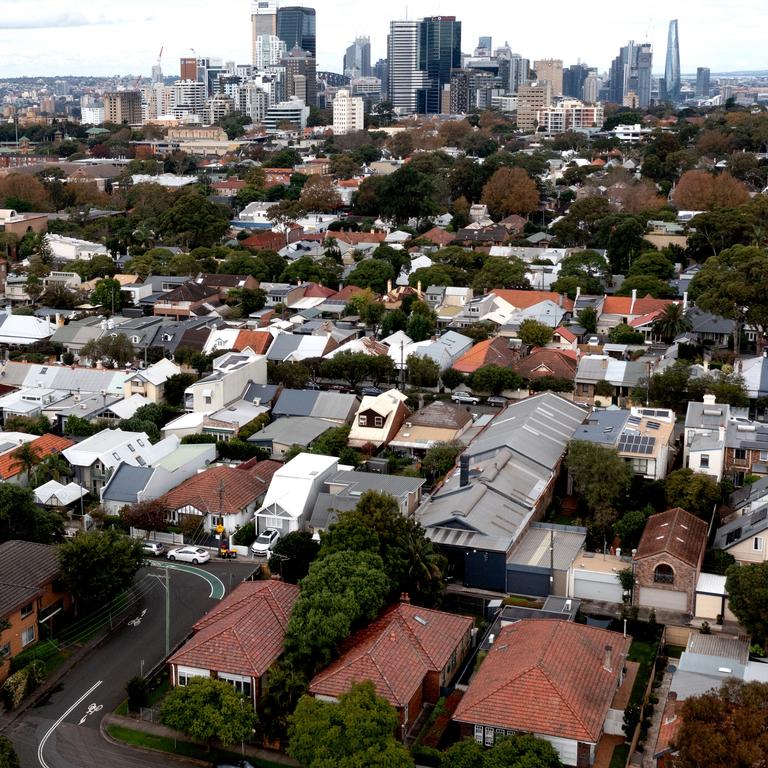The RBA could soon see a major overhaul, amid accusations that its nine-member board lacks economic qualifications.
As inflation skyrockets and borrowers grapple with sharply rising interest rates, a series of “embarrassing” missteps have focused public attention on the Reserve Bank like rarely before.
With the new Federal Government preparing to undertake a “once-in-a-generation” review of the RBA, former insiders have delivered a blunt assessment of the institution responsible for setting Australia’s monetary policy.
“The board is failing, and the reason it fails is because it lacks expertise,” said Peter Tulip, former head of research at the RBA.
Mr Tulip, who has also worked for the US Federal Reserve and is now with the Centre for Independent Studies, is one of a group of prominent economists – including former RBA board member Warwick McKibbin – calling for a major overhaul of the central bank, amid accusations its nine-member board lacks economic credentials.

Who is on the RBA board?
The majority of RBA appointments tend to be senior businesspeople rather than economists. Currently, five of the nine members have no experience setting monetary policy.
In addition to RBA governor Philip Lowe and deputy governor Michele Bullock, Treasury boss Steven Kennedy has a seat on the board – an unusual arrangement which other countries including the US have recognised may compromise the central bank’s independence – with prominent economist Ian Harper rounding out the four experts.
The five businesspeople on the board are former Coca-Cola Amatil boss Alison Watkins, Mark Barnaba from Fortescue, philanthropist Carol Schwartz, CSL director Carolyn Hewson and scientist Wendy Craik.
“It’s a bit of a caricature to say that if you know something about monetary policy, you’re almost disqualified from being on the board,” said economist Saul Eslake, who also signed the open letter to incoming Treasurer Jim Chalmers in May calling for a “wide-ranging, independent review” of the RBA’s operations and structure.
“There’s a convention that there’s one academic economist on the board – Ian Harper in particular is capable of playing an important role. The others are businesspeople, supposedly because of their experience in decision-making under uncertainty.”
Mr Eslake said he was “not disputing” that those board members are “all credible, experienced businesspeople”.
“But I would ask, do the majority of the board need that skill?” he said. “Have other central banks performed more poorly because they don’t have that skill on the board?”
The review, expected to begin either this month or next month, should encompass “the Reserve Bank Act, the Statement on the Conduct of Monetary Policy, and the RBA as an institution including its responsibilities, its structure and culture, the composition and appointment of its board, and the ways in which it communicates with the public”, the economists said in the letter.
“The review presents a once-in-a-generation opportunity,” they wrote.
“Recent decades have seen the Australian economy buffeted by unprecedented external shocks, which have necessitated rapid adaptation of both monetary and fiscal policy. Meanwhile economies across the world have experienced a long-run secular decline in economic growth and real interest rates. Now is the time for a wide-ranging, independent review of our monetary policy framework and our monetary authority.”
Mr Chalmers’ office has been contacted for comment.

Don’t want ‘part-time amateurs’
Mr Tulip, who spent nine years at the RBA, said while some of the board “do have subject matter expertise”, expertise was “not a requirement to be on the board”.
He said an analogy would be if “another big decision-making board in the papers at the moment”, the Australian Technical Advisory Group on Immunisation (ATAGI), “started appointing business leaders” to make decisions on vaccines.
“Monetary policy involves technical decisions,” he said.
“The objectives of monetary policy are essentially decided by the government and settled – 2-3 per cent inflation and unemployment. It’s a technical question of how you achieve those objectives, it’s not an issue of values or representing the community. There is a misunderstanding of the role of the board, people think it’s meant to represent community values. It’s not.”
Mr Tulip said the RBA needed to “consult widely” and that “all groups of society need to be taken into account in monetary policy”, but that should be done with a formal liaison program “as in fact the RBA has”.
“You don’t want to rely on the unrepresentative anecdotes of one random board member,” he said. “In terms of decision-making, you want experts making these decisions, not part-time amateurs.”
He added: “They’re very bright and talented people, but most of them lack the training to be able to say, ‘Phil, doesn’t the research say the opposite?’”
Mr Tulip said the RBA had made well documented mistakes, including as outlined in a recent paper by new Assistant Treasurer Andrew Leigh and Dr Isaac Gross published in the journal Economic Record.
They concluded that prior to the pandemic, between 2016 and 2019, the RBA left rates too high in order to target “financial stability” rather than its statutory objectives, leading to falling economic growth, stagnant wages and below-target inflation.
The result was an extra 270,000 people unemployed for a year, they calculated.
“Another example, Warwick McKibbin has documented how in the ’80s they left rates far too high because they were targeting the current account deficit,” Mr Tulip said.
“Paul Keating has routinely argued the bank moves too late to change interest rates. All of these reflect analytical errors, and they would not have persisted were the bank more open and honest with the Australian public. If there were clearer communication, errors would be exposed more quickly.”

RBA ‘late to recognise inflation’
More recently, critics say the RBA badly dropped the ball by leaving rates too low for too long, and has now been left scrambling in the face of skyrocketing inflation.
While some central banks including New Zealand began raising rates as early as last year, and the US Federal Reserve started in March, Australia’s central bank waited until May to finally act as consumer prices rose at their fastest pace in two decades.
May’s increase of 25 basis points was the first since 2010, lifting the official cash rate from its record low emergency level of 0.1 per cent. That was followed by back-to-back 50 basis point increases in June and July, bringing the cash rate to 1.35 per cent.
“They were very late to recognise the inflation problem they had,” said Mr Eslake. “They’ve got some catching up to do. I think they’ve made some mistakes.”
Unlike some others, Mr Eslake says he doesn’t blame the RBA for fuelling Australia’s housing bubble, instead pointing the finger at regulators like APRA being “asleep at the wheel”, and federal and state governments inflating prices with policies like first homeowner grants.
But Mr Eslake says one big mistake in the post-Covid period was putting a date on how long rates would remain low.
“As far as I’m aware no other central bank in the world put a date on it,” he said. “Certainly they put economic criteria – unemployment and inflation objectives – but only the RBA put a date on it.”
And local borrowers aren’t the only ones upset with the RBA – offshore bond investors are reportedly shunning Australia after the central bank’s failure to provide reliable guidance on inflation and interest rates.
Bloomberg reports the bank’s forecasting, which Dr Lowe conceded had been “embarrassing”, has added to reputational damage done by the RBA’s “disorderly” exit from yield curve control last year.
Yield curve control, a type of bond-buying scheme designed to stimulate the economy while interest rates were low, was also used by the RBA to underscore its forward guidance of no rate rises until 2024.
“The market’s confidence in the Reserve Bank of Australia’s messaging has definitely taken a hit,” Prashant Newnaha, a Singapore-based rates strategist at TD Securities, told Bloomberg. “Significant losses from market participants and lack of credibility in guidance have led investors to make a conscious decision to move to the sidelines.”
Dr Lowe has previously defended himself over past statements that rates would not rise until 2024, saying “the economy didn’t evolve as we expected”.
“I understand that people will make borrowing decisions based on our communication, and people took out loans that they may not have otherwise taken out,” he told ABC’s 7.30 last month.
“I also point to the fact that the economy’s done remarkably well. The unemployment rate is at a 50-year low, a higher share of the population has a job than ever before, households have built up very large financial buffers. Over the past couple of years people have put away an extra $250 billion – it’s a lot of money, and the saving rate is still high, and the number of people who’ve fallen behind in their mortgages is actually declining, not rising.”

WikiLeaks gives rare insight
Mr Eslake said he hoped the review would result either in a recomposition of the RBA board to emphasise economic expertise, or for the establishment of a separate monetary policy committee to make interest rate decisions.
“I would like [the review] to conclude the conduct of monetary policy would be enhanced if there were more knowledgeable voices around the table,” he said.
“And why can’t we see members of the monetary policy committee offering opinions from time to time? It would make for both better monetary policy and public understanding of monetary policy if the public had more insight into the diversity of opinion, rather than just have a collective voice in the minutes.”
Mr McKibbin, who served on the board for 10 years until 2011 and is now at the Crawford School of Public Policy at the ANU, was named in a secret US Embassy cable from 2009, revealed by WikiLeaks, in a rare insight into the inner deliberations of the RBA during the height of the financial crisis.
Dr Kennedy, then chief macroeconomic adviser to Prime Minister Kevin Rudd, told the Americans that “he and his Treasury Department colleagues are increasingly frustrated with the RBA”, the cable said.
They were particularly annoyed with Mr McKibbin, who had swayed some of his colleagues to his view that further rate cuts were not needed as “China will recover in the second half of 2009, which will pull Australia out of recession in the same time frame”.
“The reason I can say some of these things is because they’re in WikiLeaks,” Mr McKibbin told The Saturday Paper earlier this month.
“Because Kennedy told somebody in the American embassy, who then reported it back to Washington, that I was a pain in the a**e. Isn’t that a sad situation, that you cannot find out what’s going on in the institution that’s supposed to be acting in the national interest … unless you go to WikiLeaks?”
